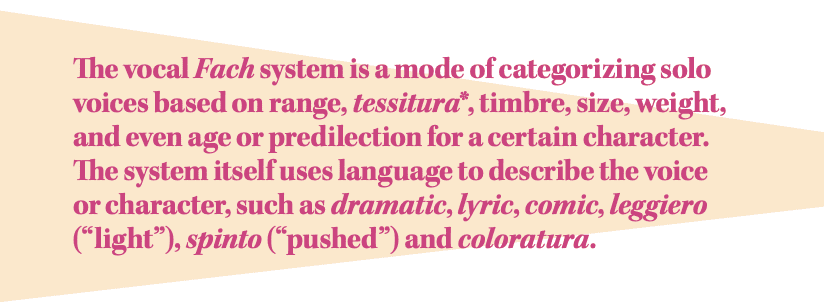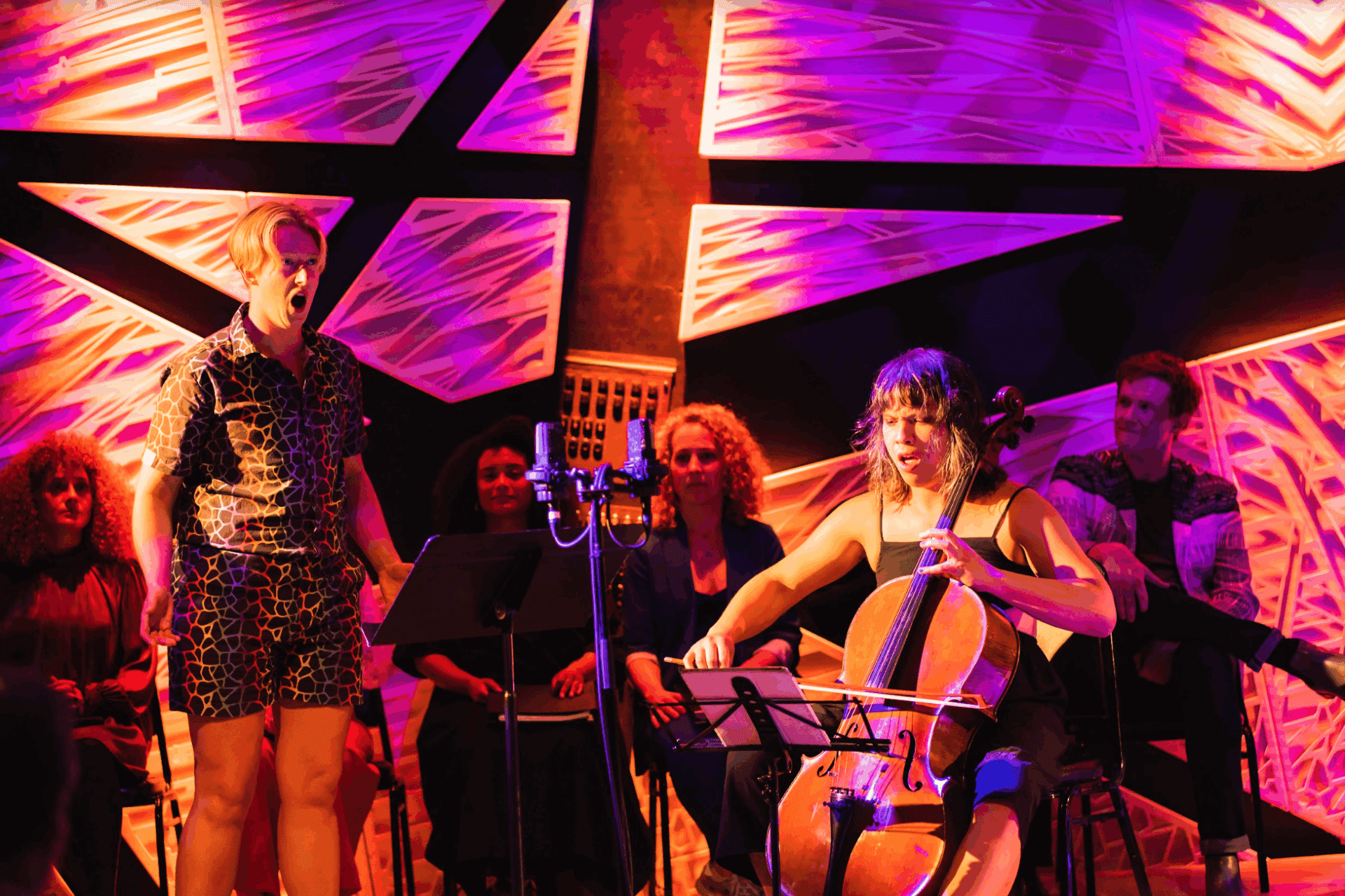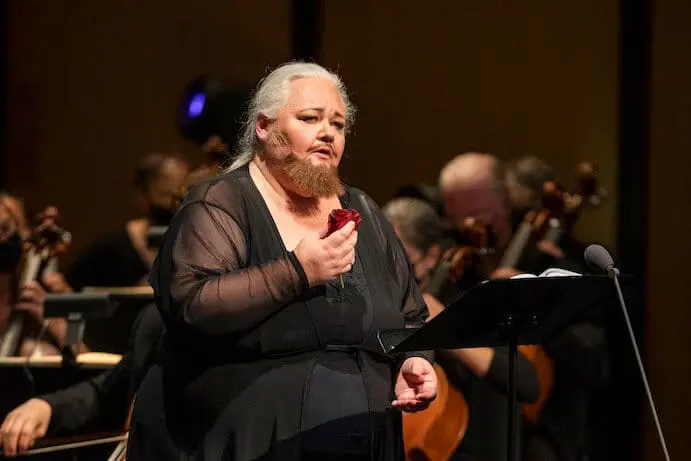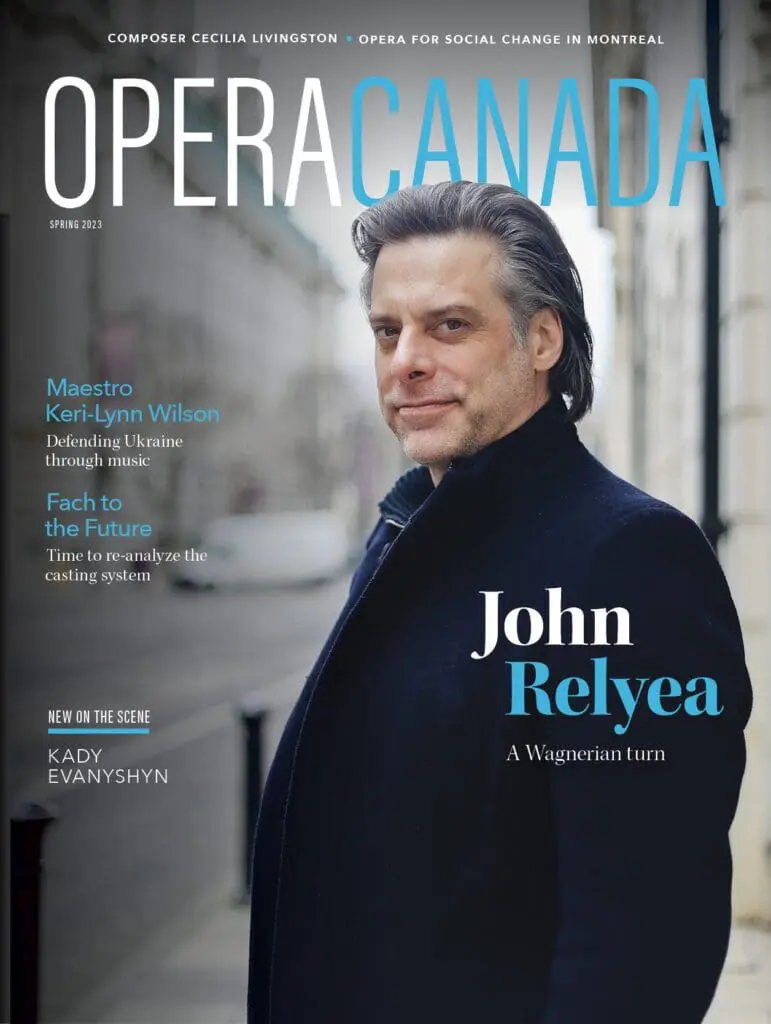SUBSCRIBE TO DIGITAL AND/OR PRINT MAGAZINE
*this text was originally published in the Spring 2023 print version of Opera Canada magazine
Patricia Yates tells us why it’s time to ditch the voice classification system used heavily in the opera industry to cast roles.
As a transgender opera singer, I often feel that my role in the studio, and on stage, is to challenge ideas and subvert the form. I walk into a room and subvert conventions of gender, simply by existing, so I may as well embrace that mold. One tenet of my identity as an artist and member of the opera community is that, in order to survive, art must evolve and adapt, responding to and challenging contemporary attitudes. Opera is an artform which often looks to the past for reference, whether it be for contextual information for a production, or the musical scores themselves, the dominant portion of which, as we know, are by dead, white men.
There is continued need for evolution and adaptation within our artform to avoid stagnation in outdated ideas and a “stale, pale and male” canon of repertoire. This evolution will be multi-faceted, for example: the abolition of blackface, in such operas as Othello, Aida, Les Pêcheurs de Perles and Die Zauberflöte; the performance of more operas by living composers, as well as deceased and living female composers, BIPOC composers, and LGBTQ+ composers; increasing the accessibility of opera to a wider demographic of audiences, and challenging the notion that opera is for “the elite”; and, the focus of this article, the abolition of the unnecessarily gendered vocal fach system, at least in its current applications. The fach system has a chokehold on the inherent gender roles that opera singers are forced into, leaving gender-variant individuals unable to create authentically from their gender experience, and cisgender (non-transgender) individuals unfulfilled in their own limited gender expression. As time will tell, in order to enact structural change, we must apply radical ideas.

The vocal fach system, with its origins in early-nineteenth-century central Europe, is a mode of categorizing solo voices based on range, tessitura*, timbre, size, weight, and even age or predilection for a certain character. The system itself uses language to describe the voice or character, such as dramatic, lyric, comic, leggiero (“light”), spinto (“pushed”) and coloratura. Prior to this system, singers might have been expected to sing the majority of repertoire within their broader voice type (soprano, tenor, etc.). The nineteenth century brought with it the dawn of larger accompanying orchestras. The presence of a thicker accompanying texture led to a realization: different voices cut through the now-varying textures within the operatic canon, with differing degrees of efficacy at various pitches or tessiture. There was an overall growing understanding of the resonant capabilities of the human voice, bringing more varied timbral and registral range to the operatic canon. Therefore, certain voices, usually those with larger, darker-toned voices, suited a lower tessitura, and those with lighter, brighter voices suited a higher tessitura. In tandem, composers expanded the musical and expressive range of the roles they wrote. Thus, the fach system was created to categorize roles by the voices to which they were best suited.
The fach system was originally used by opera houses who operated on a repertory casting basis, employing salaried soloists to sing all roles in a particular season within their fach. Many German, Swiss and Austrian houses still use this system today. It facilitates casting and programming decisions. However, the fach system has been misused and misappropriated, particularly in North America, where many companies do not use a repertory casting system. Pioneers and authorities on the fach system, such as Richard Boldrey (author of “Guide to Operatic Roles and Arias“), offer much flexibility in their fach assignations, stipulating that the system is a guide only. This flexibility seems to have been largely forgotten or ignored throughout much of the twentieth and twenty-first centuries. The treatment of the fach system as gospel truth to which singers must adhere with great stringency has led to a deficit in the creative and expressive range of artists. This particularly affects students and those singers at the beginning of their performing careers who may incorrectly believe that they have to choose a fach and remain confined within it. Singers who subscribe to the fach system are hesitant to experiment with repertoire outside of “their” fach, afraid of stepping outside of this imaginary boundary.
Many in the operatic world have uttered disappointment at never hearing, for expressive and dramatic purposes, a more lyric Manrico (Il trovatore), or a more baritonal Dulcamara (L’elisir d’amore), or a darker, heavier Violetta (La traviata), and have therefore called for a breaking down of the creative limitations of the vocal fach system. I propose we take this further, in order to also break down some of the antiquated rhetoric surrounding gender and voice, which mostly concerns the binary notion of “male” and “female” voices. I imagine a utopian standard for casting whereby, if one can comfortably sing the role at any octave, the voice be heard and understood over the orchestra, and the character believed, that the casting choice would be a viable one. In this hypothetical world of fach-less casting, we singers would be able to look at a much greater pool of repertoire, for example sopranos and mezzos could sing tenor and baritone repertoire and vice versa. As long as the transposition is precisely an octave, judgement-free casting could even be used for full productions.
I project that this system will solve the problem of a population of young, talented singers, saturated with sopranos with few opportunities to sing roles. The operatic canon, historically, has far more roles written for the lower three voice-types, than any others, once all leading and supporting roles are taken into account. The voices of women, historically, have been generally absent in the telling of stories on the operatic stage. We can imagine that there may have been a level of systemic misogyny at play throughout the seventeenth, eighteenth and nineteenth centuries, and much of the twentieth, rendering any argument for more representation of female characters on stage rather futile. Today, that is changing. Casting a percentage of the tenor, baritone and bass roles as sopranos or mezzo-sopranos would help to balance the books, giving much needed opportunities to those upper voice-types.
I would like to recognize that, to an extent, there are some companies making bold strides with their casting decisions. Mezzo soprano Stephanie Blythe has recently taken on two male roles: with Chicago Opera Theater, Don José in Bizet’s Carmen; and with San Diego Opera, the title role in Puccini’s Gianni Schicchi. Both of these Blythe sings come scritto, at the tenor or baritone pitch. What excites me about this, is that Blythe is such a terrific actor, and able to tap into her masculinity to bring these roles to a level of credibility on par with a portrayal by a tenor or baritone, and she’s being given the chance to prove it. It ought not to be a taboo or radical act to have someone singing a role which suits them. The taboo is perhaps a side effect of this instance being “historic,” as the first on a professional stage like those in Chicago and San Diego.

Lucas Bouk, trans-masculine opera singer, and cellist Andrew Yee at ChamberQUEER at National Sawdust, June 2022 Ⓒ National Sawdust
We have seen a great revolution of the status quo in opera in the past, when the barbaric practice of castration was outlawed, and a swathe of roles became up for grabs. Now, it is common practice for a mezzo soprano or countertenor to take on these roles previously written for the castrato voice. However, it was not uncommon for some major renaissance and baroque opera roles written for castrati to be taken over by baritones before the widespread revival of early music. Such roles as Gluck’s Orfeo (Orfeo ed Euridice), Handel’s Cesare (Giulio Cesare in Egitto), or Ariodante (Ariodante) have all been performed extensively by baritones, while Handel’s Sesto (Giulio Cesare in Egitto) and Mozart’s Idamante (Idomeneo) have both been sung by tenors.
There are also some other commonly fach-switched or octave-switched roles in the canon, such as The Witch in Humperdinck’s Hänsel und Gretel, and Prince Charming in Massenet’s Cendrillon. It is worth remarking that all of the above examples give more roles to the lower voice types, the majority of whom are men, and already blessed in an abundance of roles. I envisage a more equal, unbiased system, in which every singer of each voice-type is granted the same freedom to create in different Fächer which may suit their voices or characters.

In a world which has consistently vilified transgender women in the media, it is interesting to note that, in casting a tenor as Humperdinck’s Witch, you create an ugly and evil trans-coded character who preys upon children. Especially in today’s climate, with politicians legislating against the freedoms of trans people in the USA, and growing anti-trans “groomer” rhetoric all over the Western world, these kinds of casting decisions can even prove to be dangerous. Woe betide a tenor or trans woman who portrays a beautiful, benevolent or powerful woman. The rest of the above fach-switching examples, in fact, render the characters more cis-normative in terms of their gender expression, in that they become males with low voices.
According to the fach system, opportunities for transgender singers to perform within their gender expression are few and far between. Some transgender male singers, such as Lucas Bouk or Holden Madagame, lower their voices with testosterone treatments, and sing male roles. Other trans men who choose not to medically transition, such as Adrian Angelico, may specialize in what we traditionally think of as “pants roles”. Besides those who transitioned before going through a male puberty, or trans singers like Breanna Sinclairé, who trained her voice up into the soprano range, transgender female singers don’t quite have the same options, with very few “skirt roles” existing in the canon. In my utopian fach-less society, I and other transgender singers would be able to choose our repertoire based on what we are drawn to, musically and dramatically, and would feel that we can create authentically by performing and existing in our own gender.
That is not to say that the interpellated antique gender roles in the fach system affect trans and genderqueer singers exclusively, but that they are affected disproportionately. There are universally damaging gender stereotypes at the core of the fach system, and the way in which we, as opera consumers, have been conditioned to expect certain types of characters to sound, in terms of their vocal range. For example, young lovers are tenors and sopranos; the scarlet woman or the plucky young chambermaid is also a soprano; the father or villain is a baritone; the king or wise old man is a bass; the young royal or nobleman is a countertenor; the mother or witch, or cousin, or mysterious old woman, or maid, or… fortune teller… is a mezzo-soprano. The mezzo spread consists of a wider miscellaneous hodgepodge of characters, compared to other voice types, and of course there is variation and exception to be found in all of these voice-type tropes. However, the larger picture is that when this formula has been repeated for centuries, we find it difficult to break habit. Heterogeneity and change are two of the most difficult things to achieve in a stable society.

Stephanie Blythe in Chicago Opera Theatre‘s Carmen Ⓒ Michael Brosilow
The fach system also brings attached to it a whole host of assumptions and standards of body type, which, of course, disproportionately affects women. It is not uncommon to hear of a soprano who has been rejected, typically from a romantic lead, because of her look—often she is considered too fat, or too short to be romantically credible. This is a standard which is changing, but is also strongly attached to the assumptions about the fach system, which older, authoritative men have often used to belittle, discredit and discriminate against women who do not fit the ideal image according to the straight male gaze.
Alas, a utopia will oft remain a utopia, and, speaking in realistic terms, we must strive for hybridity in our near future. Tradition will always be a part of opera, and I recognize the importance of it. But perhaps, if minds can be opened to include a little flexibility in decisions made at the casting table, some fach-bending and gender-inclusive rhetoric may open the door to a world of possibility which has, as yet, been woefully unexplored.















